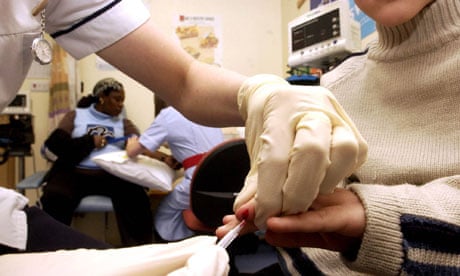Widespread failings in NHS care for the growing number of diabetics lead to 24,000 unnecessary deaths each year and many others suffering complications such as blindness and amputation, a damning report by the government's spending watchdog reveals.
Treatment of diabetics in England is so inadequate that barely half of the 3.1 million people with the condition receive the regular NHS checks intended to keep them as healthy as possible, the National Audit Office (NAO) found.
Every diabetic is meant to undergo nine care processes each year, such as having blood pressure, blood glucose and cholesterol levels measured, eyes examined for damage to the retina, and the skin, circulation and nerve supply of feet checked, to reduce the risk of complications.
But the NAO's inquiry found that in 2009-10 "only half of the increasing number of people with diabetes received all the recommended care processes", despite the Department of Health (DH) having set out the care standards as long ago as 2001.
The DH admits that 24,000 diabetics die prematurely every year from conditions related to their diabetes which could have been prevented, the report concludes.
Barely one in seven diabetics was achieving recommended treatment standards that also reduce their risk of complications. Just 16% of patients received adequate treatment to control their blood glucose, blood pressure and cholesterol levels. And 69% failed to reach at least one of the standards while 15% had no testing at all, leaving both groups with a greater risk of developing problems.
The report also criticises the wide variation in the quality of care diabetics receive. Mid Essex NHS primary care trust (PCT) only managed to give 6% of its diabetic patients all nine checks in 2009-10, while the best performer, Gateshead, still only did so for 69% of its patients.
Better management of diabetics could save the NHS £170m a year, the NAO said. "It is shocking that 24,000 people with diabetes are dying unnecessarily each year. The department has spent 11 years on this, but is still failing to deliver the standards of care it promised," said Margaret Hodge, chair of the cross-party public accounts committee, adding it was "completely unacceptable" that so few diabetics get the care they should and that quality of care is down to a postcode lottery.
The report is "a damning indictment of the current approach to the condition", said Barbara Young, chief executive of Diabetes UK. "It has been clear for the last 10 years what needs to happen to fix the problem, but the plan the government published on this has never been implemented. Action is needed now and escalating diabetes costs threaten to wreck the NHS budget, so this is an issue that affects all of us, not just people with diabetes."
The NHS Confederation, which represents hospitals, said the NHS had to take the report's messages seriously and "needs to raise its game on the treatment of all long-term conditions, not just diabetes. The stark truth is that long-term conditions are affecting a growing proportion of the population and the NHS needs to respond to changes in people's needs", said David Stout, its deputy director.
"We know there is no chance of more money any time soon. So we need to change the way we deliver care," he added, such as through public health initiatives to stop people getting ill in the first place, moving care out of hospitals closer to people's homes and integrating health and social care.
Paul Burstow, the care services minister, welcomed the report, which he said confirmed what ministers already knew about the variable standards of care patients receive.
"There is no excuse for delivering anything but the best diabetes care. Nice guidance and quality standards set out what good care looks like. By exposing poor practice and shining a light on best practice we are determined to drive up standards for everyone", he said.
The DH is drawing up a new outcomes strategy for all patients with a long-term condition, he added.
